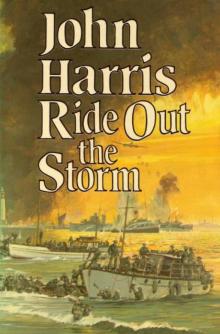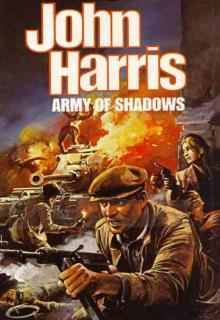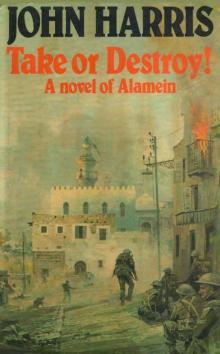- Home
- John Harris
The Claws of Mercy Page 2
The Claws of Mercy Read online
Page 2
Earnshaw accepted the compliment of his astonishment with the bland boredom of one who had seen everything – most of it twice – and Jimmy, gagging in the heat that swept up to him in waves from the engines, studied him for a while, trying to make out his official capacity at the Ma-Imi mine.
“You work for the mine, too?” he asked eventually.
“Nah! Not me.” Earnshaw’s contempt was withering. “I work for meself and happy as a parrot on a kitchen table doing it, I am.” He appeared to be impervious to the heat, and indeed his withered frame looked as though all the moisture had long since been dried out of it and he had been left with the dehydrated look of a prune.
“Admiral of the Sierra Leone Navy I am,” he said. “Do all the fetching and carrying up-river. Supplies for Amama. There isn’t no deep-water anchorage, see? Spare parts for Ma-Ima. Petrol and goods for the United Africa Company farther up at Moyamba. I got a fleet o’ wog boats converted to barges and scows and a few of these here powered jobs to tow ’em. Archibald Earnshaw Incorporated. Large as life and twice as nasty. Mayor of Amama. That’s me. Anything you want, just mention my name.”
They moved across the bright, blinding surface of the water, through the steamers and tugs and the crowding canoes carrying fruit down-river to the market at Kru Bay, through the clusters of bumboats still hovering round the ship which had brought Jimmy to Africa the day before, their occupants offering all manner of cheap merchandise as souvenirs, or shouting their willingness to dive for shillings while wearing top-hats, frock-coats or even water-wings.
Earnshaw’s eyes were narrow as he studied Jimmy, whose round pink face, just a little dazed still, wore a look of intense curiosity that made him seem even younger.
“You met Twigg, your boss, yet?” he asked.
“No.” Jimmy grinned. “What’s he like?”
Earnshaw replied with another question. “You play cricket?” he asked.
“No. Why?’
“You soon see.”
Henry Twigg, the manager of the Ma-Imi mine, a handsome man, lean and stringy like a faded athlete, met them with a jeep as the boat drew into the landing-stage there.
The sun had reached its summit in the sky by this time and the heat-saturated earth was flinging back the glare. Sirocco waves were coming from the engines in blasts that scorched the face and the cabin roofs were too hot to sit on. The early blueness of the heavens had changed to a shrill metallic glow that was reflected dazzlingly in the unruffled water.
The landing-stage was a bare stretch of broken concrete slabs where small green lizards basked in the sun, disappearing in sudden zigzag flashes like coloured darts of flame as the boat nosed alongside. A grimy, rust-covered coaster with awnings rigged and sagging in the stillness was loading in a hanging cloud of dust below a conveyor that was bleached to the colour of old bones.
Twigg drove them through the dense vegetation to the mine area, talking all the way through the fumes from a faulty exhaust that wafted back in cloying folds, dulling Jimmy’s mind and taking away all thought beyond the desire to get out of the jeep and breathe what would be comparatively fresh air.
“Laid on a party for you tonight,” he was saying. “Might as well enjoy yourself, old boy, before you pass on. Quieter up at Amama where you’re going. No club or welfare up there. Bit of tennis, that’s all.
“Me, I prefer cricket,” he went on almost casually and Earnshaw muttered under his breath from the rear seat.
“Oh, Gawd,” he said. “Hold your hat on. Here it come.”
“You play cricket at all?” Twigg turned to Jimmy with disarming unconcern.
“A little,” Jimmy lied, deciding to be diplomatic in view of Twigg’s obvious enthusiasm and Earnshaw’s shifty muttering.
“Good show. You can organise a team up at Amama and we’ll arrange matches. Earnshaw can transport the teams.”
“Ho, can ’e?” Earnshaw growled almost inaudibly just behind Jimmy’s ear. “Catch ’im doing it.”
“We’ve got a matting wicket here,” Twigg continued gaily through the clouds of dust that came into the jeep at one side and out at the other. “On concrete. Only trouble, there’s a crack at one end and it leaves a bad patch. Damned annoying. Cost me a lot of money, that pitch, and it’ll have to come up in the end, I suppose.”
Jimmy was staring about him, wide-eyed, enjoying the experience of being in Africa. “What sort of top soil is it here?” he inquired.
“Oh, the usual,” Twigg replied casually. “Damn’ dusty. Crumbles too quickly for cricket. Jolly keen on cricket here. Pity you’ve got to go up to Amama tomorrow. Might have found you a game.”
He blew a blast on the jeep’s horn that sent a couple of mammies scuttling for their lives and roared into the residential area of the Ma-Imi mine.
The concrete bungalows, like a neat army camp, fronted on to a dusty square, where a group of black boys lazed with the dogs under a cotton tree whose buttressed trunk seemed as antique and immovable as Africa itself. Overhead, the inevitable vultures hung, like jagged rents in the shining sky, and beyond, the forest crept down from the hill where they dug the ironstone. Over the tops of the trees, Jimmy could see the roofs of uglier, more utilitarian buildings which he assumed were the crushing plants, the offices and laboratories, and the head of the railway that ran through the bush to the water’s edge.
He was itching to see more of the mine but it was only after a meal and a sleep and a great many hints that Twigg condescended to conduct him round. He had been showing him photographs of his cricket team, a lot of bored Africans, with, in the centre, Twigg himself holding a bat and wearing a striped blazer, and he looked up, faintly irritated by the interruption.
“The mine?” he said. “Well, yes, I suppose I can show you round. Come on. Might as well go now. Mustn’t be long. Got to be back for the party tonight. Welcome to Africa sort of thing. Help you to get to know everybody.”
He drove furiously away from the bungalow, wiping his moist face with a purple handkerchief as he negotiated the blind bends between the trees, while Jimmy hung on with both hands and began to wish he’d kept his mouth shut.
“You’ll be on your own up at Amama,” Twigg said through the dust, which Jimmy had by now added to the heat and the crowds as the major discomforts of Africa. “Except for Gotto. He’s all right,” he went on in a non-committal manner which was hardly a recommendation. “Not exactly a thing of beauty and a joy for ever. Doesn’t play cricket,” he ended, as though this failing placed the absent Gotto beyond the pale. “Doesn’t play any damned game, in fact,” he said with a burst of irritation. “Can’t understand a chap who doesn’t play anything.”
He waved a hand vaguely in the direction of the river. “He went up today. He’ll show you around. He’s been up before on relief and he knows his way about. It’s dead easy, of course. No overburden. You can nearly scrape up the ironstone with a teaspoon. Opencast, of course, like this. Rich. Damn’ rich. Always had a sneaking regard for the place myself. Nice and quiet.
“Only thing against it is the distance. No telephone, y’see. If there was, you’d always get the wrong number anyway. You always do out here. Between you and me, we’re not making much profit out of Amama. It’s too small and we need a heavier and faster railway, but I want to prove its potentialities. God, this heat!”
His concluding sentence was tacked to the others, almost as though it were more information about the mine.
He halted the jeep to mop his face with the purple handkerchief and, having finished, showed no inclination to start it again. “Of course,” he said, sitting back. “You’ve no crushing plant or anything like that. All you’ve got to do is see that the stuff’s loaded on the old railway and sent down here. We’ll do the rest. Just look after Gotto, that’s all. That’s enough for anybody. I’ll be up in a couple of months to see how you’re getting on.”
He stopped flapping the flies away with his handkerchief to light a pipe, blowing out clouds of blue smoke whic
h hung motionless on the still, dry air. “You’ve no engineer,” he continued between puffs. “Earnshaw sees to anything like that if you need it. If it’s too much for him, we send up from Ma-Imi. And you’ve got Alf Momo. He’s shift boss. African. Very clever. Fine type of chap. Pity he don’t get on with Snotty Gotty.”
Jimmy’s growing apprehension burst out of him at last.
“What’s Gotto like, sir?” he asked.
“He’s all right,” Twigg said again, but, Jimmy noticed, once more without any marked enthusiasm. “Pity Jarvis got malaria and had to be sent home. Still–” he flashed his brilliant smile at Jimmy “–chance to get rid of Gotto, eh, till he goes home. Only a few months now, thank God. I shall miss Jarvis, though. Jolly good cricketer. All these blasted people they send out to me these days are tennis players and it’s a hard job getting the Africans interested. The bastards prefer football.”
“About the mine, sir,” Jimmy prompted feebly as he saw Twigg’s attention wandering again. The red scar on the hillside was not much nearer to them than when they had set off.
“Oh, yes, Amama.” It seemed to require an effort of concentration for Twigg to return to the subject. “A sort of experiment. Any setback would shut the place down immediately. We’re not as big as the Development Company people at Marampa. We can’t afford snags. They only want results in London. Easy money, that’s all. Big returns for no outlay. Still, they have agreed to a new concrete jetty so the lorries can get closer to the conveyor. That’ll be part of your job. There’s a gang of Africans handling it. I know it’s not strictly our line of country but we have to do these things out here. Especially in a place like Amama. It ought to be ready before the rains come.”
He sighed. “That’s the trouble with this coast. The rains. A hundred and fifty inches of it and all in a few weeks. It ruins everything. Farming. Soil. Sport. You get sick of it. Sort of ‘Oh, what the hell!’ It gets under the concrete, y’know.”
“The concrete, sir? Which concrete?”
“The cricket pitch.” Twigg’s eyebrows lifted in surprise – as though Jimmy had not been paying attention. “Have to relay the damn’ thing after every rainy season. Always cock-eyed or something. And the damned rats eat the string off the bat handles. Awful hard to keep going.”
Jimmy was beginning to see himself arriving at Amama with no more foreknowledge of the place than that cricket there was difficult.
“What equipment have you got up there?” he asked.
“Cricket equipment?”
“No. The mine.”
“Oh, the mine. Not much. All the usual. Diggers. Scrapers. A dumper. A few lorries. Euclids, most of them. All old stuff. All we could spare from here. Plenty of labour, though. Wonderful material for a cricket team.”
“You seem keen on cricket, sir.”
“Oh, rather.” To Jimmy’s anxious eyes it seemed that their tour of inspection was over. Twigg had switched off the jeep’s idling engine. “Rather. Cricket breeds gentlemen. Wouldn’t have half the trouble we do out here if they only played more cricket.”
He mopped his face again. “Look, old boy,” he said abruptly. “Let’s head the other way. No need to mess about round the workings. It’s hot and dusty at this time of the year and there’s no sense in sweating more than necessary. I don’t suppose you’re all that keen on seeing them, are you?”
“Well, no, sir.” Jimmy had felt it was his duty to find out something about his work but Twigg didn’t seem concerned. “I just thought I’d like to get to know a bit. That’s all.”
“Plenty of time tomorrow, old boy.”
“Aren’t I going up to Amama tomorrow?”
“Oh, hell, yes! And while you’re at it, you’re taking one Samuel Assissay with you. Bloody agitator–”
“Agitator?”
“Yes. One of these mission-educated Africans who thinks he’s Christ’s brother-in-law. Spouts the Bible and wants the Whites out of Africa.” Twigg waved a hand airily. “Shipping him back to his home village. Comes from up-country somewhere beyond Amama. Earnshaw will take him up with you and drop him there out of my territory. Let someone else worry about him.”
“Is he dangerous?’
“God, no, old man! Just a nuisance, that’s all. Stirs my boys up. More ju-ju than agitator. Too much mission talk in his head. Keep him away from Gotto, for heaven’s sake.”
In spite of Twigg’s words, Jimmy’s first sight of Gotto at Amama the following day was disappointing.
As they turned into the creek out of the main stream – with Carmen Mirandy going full blast once more like a fairground steam organ in the cabin – the spit of land with its amphitheatre of trees looked shining and golden in the deep tranquillity of the afternoon and, to Jimmy, sweating on the foredeck as far away from the engines as he could get, disturbingly hot.
A rusting conveyor overhung the glittering brown water – obviously a home-made contraption rigged by the departed Jarvis. It looked as though it needed as many men to keep it standing as were required to see that the ironstone was loaded on to it and into the string of barges below. The landing jetty, a ramshackle affair of grey weathered wood on stilts, as impermanent-looking as the conveyor, with a hut at its shoreward end, looked incapable of holding a dozen people let alone the throng which was gathered on it. There appeared to be no space anywhere for another human being. From one end to the other it was packed with black figures, most of them children. In the middle at the front were two solitary white people, a man and a woman.
Earnshaw peered over the edge of the steering well as they rounded the bend. “Oh, Lor’,” he said. “Swannack’s waiting to give you an ’ero’s welcome. He always does this for strangers.”
“Who’s Swannack? More trouble?”
Earnshaw shifted his fag-end from one side of his mouth to the other with his tongue. “Nah. Missionary. Bible-basher. Praise the Lord and pass the ammunition. Yankee, but he’s all right. Don’t get in your hair much. His daughter’s here on a visit. From the look of her photo on her ma’s dresser, she’s no Carmen Mirandy but she got it in all the right places and in the right amount.” He smirked at Jimmy, sly, wily and suggestive. “Company for you, old lad. Company’s a good thing to have here. I got Zaidee.”
“Zaidee?”
“Zaidee Soloman. She’s my girl. She’s a widder. Don’t use her married name, though. Her old man runs the store at Amama. There isn’t no United Africa Company here, see. Indian Joe’s his name – Joseph Soloman. Yusef Suleiman, if you want his real monicker. He’s a Syrian and he’ll be out to do you.”
“Thanks for the tip.”
“That’s all right, old lad. Watch him. When it comes to fiddling, he could blind you with science. He’s a right boy. If he wasn’t, there’d be no Zaidee. The Syrians don’t mix much normally. They stick to their own kind.”
“And Zaidee?’
“Her ma had a bit of nig in her somewhere and Zaidee’s butter-colour. One of coffee, two of milk. Heat don’t affect her. Nig blood keeps her cool.” He glanced at Jimmy and went on in his flat whine as the boat approached the jetty. “We been going steady for a bit, y’know. She likes a white bloke. Fancies she’s white herself. Makes her a bit crusty sometimes when she finds she’s not. Mind, I’m not one of these blokes what have a different darkey girl hanging round the place every other night. They’re dead common, they are. All you get outa that lark is a bad reputation and kinks in your spine.”
Earnshaw grinned and scratched his dusty hair. “But you need company, old lad. You get sick of being alone. You got to keep it on the run, you know.”
“I’ll be all right,” Jimmy said defiantly. “I’ve got Gotto.”
Earnshaw gave a bark of laughter and Jimmy frowned. “What’s wrong with this Gotto?” he demanded.
“You see soon enough.”
“Listen,” Jimmy said angrily. “Everybody seems to know this blasted Gotto. What is wrong with him? Has he got two heads or something?”
Earnshaw g
rinned shiftily. “If it was me coming to work with him,” he said portentously, “I’d call out the perishing Navy.” He glanced shorewards where they could hear a voice counting slowly – “One – two – three–” and he turned towards the cabin.
“OK, Suri,” he called. “Switch off the gramophone. ’Ere it comes.”
Even as Carmen Mirandy was cut explosively short in mid-sentence, fifty young trebles, led by an aggressively high-pitched contralto, came across the water in a wavering hymn, slightly too slow and a little off-key.
“Onward, Christian Soldiers,” came the brassy contralto.
“Marchy nasty war,” came the fifty young trebles.
“Wither Crossy Jesus,
Goin’ Gone befar.”
The hymn followed them as Earnshaw edged in and out of the mud banks, back-tracking on itself as they turned in a big sweep under the towering mangroves that edged the river and finally blaring off in a triumphant serenade as the engines were switched off and Earnshaw signed to his crew to make fast.
“Them Swannacks do it better every time,” he commented heavily. “Nice timing, Rev.,” he shouted to the jetty. “Finish just as we arrive. Proper smashing it was. Solid bar gold.”
“The new guy like it?” The white man on the jetty grinned proudly.
Nudged by Earnshaw, Jimmy nodded hastily. “Jolly good,” he said enthusiastically and Swannack grinned again.
“It’s the one we know best, brother,” he said. “We all like that one. It makes a nice welcome.”
While his wife fussed among the black children, marshalling them into order – “Bryma. Malaki. Into threes. Hurry up there, you, Lamina. Back to the schoolroom” – Swannack climbed down on to the boat. He was a hefty man with black hair growing in tufts all over his face – from his eyebrows and on his cheeks – so that he looked a little like a worn-out old broom.

 China Seas
China Seas The Mercenaries
The Mercenaries Road To The Coast
Road To The Coast The Thirty Days War
The Thirty Days War The Old Trade of Killing
The Old Trade of Killing Ride Out The Storm
Ride Out The Storm Corporal Cotton's Little War
Corporal Cotton's Little War Fox from His Lair
Fox from His Lair Paint The Rainbow
Paint The Rainbow Flawed Banner
Flawed Banner Covenant with Death
Covenant with Death So Far From God
So Far From God The Sea Shall Not Have Them
The Sea Shall Not Have Them The Cross of Lazzaro
The Cross of Lazzaro Smiling Willie and the Tiger
Smiling Willie and the Tiger Harkaway's Sixth Column
Harkaway's Sixth Column The Sleeping Mountain
The Sleeping Mountain The Claws of Mercy
The Claws of Mercy North Strike
North Strike Picture of Defeat
Picture of Defeat Army of Shadows
Army of Shadows Right of Reply
Right of Reply Getaway
Getaway The Lonely Voyage
The Lonely Voyage Take or Destroy!
Take or Destroy! The Backpacker
The Backpacker A Funny Place to Hold a War
A Funny Place to Hold a War Swordpoint (2011)
Swordpoint (2011) A Kind of Courage
A Kind of Courage